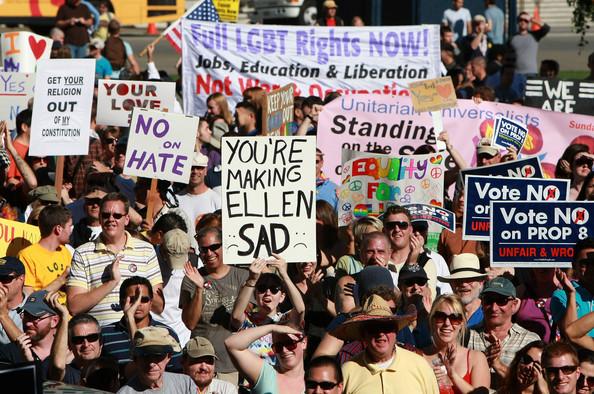On November 6 voters across the country braved the harsh weather and long lines to lend their voices to very important causes that were lost in presidential election coverage were the very noteworthy ballot measures voted on across the nation. These ballot measures brought forth remarkable change and help progress an ever-changing America.
Ballot measures are referendums or questions asked to an entire electorate body concerning different issues. Usually these ballot measures concern simple issues, such as taxes and property rights. However, in 2012 several states voted on and passed numerous ballot measures that dealt with important issues facing America. In the 2012 election, the ballot measures included the legalization of both marijuana and same sex marriage, state funded abortion and the possible elimination of the death penalty and they brought with them a wave of change.
After nearly half a year after President Barack Obama became the first sitting president to announce his support for same sex marriage, many states followed his lead. On election night, voters in Maine, Maryland, and Washington voted to allow same sex marriage in their respective states. In addition, Minnesota voted to reject a ballot measure that would ban such marriages. Now, nine states, including the District of Columbia, have legalized same sex marriages.
The legalization of marijuana has been a increasingly hot topic, especially as medicinal use rises. On November 6 Arkansas and Massachusetts joined sixteen other states to allow the use of medical marijuana. However, the biggest news came from Colorado and Washington as they became the first states in the nation to legalize the recreational use of marijuana, barring any action from the federal government.
Other notable ballot measures were seen in other states across the country. Voters in Florida voted to deny public funds for abortion while Wyoming, Montana, and Alabama put a limit on Obamacare. Those in California voted to deny a referendum that would have eliminated the death penalty and replaced it with a life sentence without parole, and in Oklahoma, voters decided in favor of banning Affirmative Action programs in the state.
One can judge the implications and the consequences of such decisions by the American people, yet what we cannot do is underestimate the pace at which America is changing. Surely, throughout it’s history, America has regularly revolted against the status quo. Americans, many times, have defeated what was expected and what the world accepted. The spirit of rebellion and change is what led women to fight to vote, African Americans to struggle for equality under the law, and men to strive to land on the moon. It’s that same spirit that has fueled today’s engine of change in America.
Today’s America is different than the one from just a generation ago. Today a majority of Americans now support same sex marriage and the number of those fighting for the legalization of marijuana is on the rise. Laws across the nation are being challenged and taken apart at an escalating pace, and many of laws being taken down no longer represent the values of a changing America. Americans have built for themselves an evolving nation that represents evolving opinions.
However, even many champion themselves as pioneers of change or upholders of “traditional” values, they reunion unaware of consequences. What many rally against today reflects what happened not too far long ago. For example, protest marches for gay rights now fill the streets of America and sound across the radio waves and the floor of the U.S. Senate just as many called for African American equality only a few generations ago.
What happened in history is being repeated today. Born out of these events are good debates about serious issues, yet voters have and will continue to become disgusted with the political system and the slow pace of change. Issues like abortion funding and gay marriage are serious topics that need to be addressed, but this doesn’t come with consequences. Today, elections are now largely decided on a candidate’s social and religious views. Not to say these opinions aren’t important and shouldn’t be scrutinized, yet a candidate shouldn’t lose an election because he or she holds unpopular views.
In Indiana’s Senate election one of its candidates was written off because he spoke his mind. In a debate, the candidate, Richard Mourdock, said he opposes abortion with the exception of the life of the mother. This what he truly believes in, yet he lost because he said, “…I think even if life begins in that horrible situation of rape, that it is something that God intended to happen.” What he believed both religiously and in terms of public policy caused him to lose. The problem is that his views didn’t align with the majority of Americans and Mourdock lost because of that.
What happened to Richard Mourdock is what has been happening in nationwide elections and what will continue to happen when Americans draw such a definitive line in public policy. In today’s America, compromise is nearly impossible because citizens can’t find any middle ground with people of opposing views; especially people who share “traditional” values. Therefore, social policy and political blunders decide more elections than serious discussions on real policy.
Americans have done this to themselves. People can no longer disagree without being disagreeable. Political moderates are too hard to find and voters generally frown upon them. Pundits paint the opposing party as the party who is out to destroy the country and destroy what they believe is right. These are the consequences of a changing America; people who don’t agree anymore and progress that is too slow.
America is changing. To some, traditional values are becoming increasingly endangered and the next generation is at great risk. Others, believe the new trends reflect civil and social advancement. The U.S. is a very different place and it’s future will be, immeasurably, unlike the world we live in today. America will continue to change, issues will continued to be hotly debated, and Americans of every background and political stripe will continue to shape the U.S. and collectively build the torch that is to be passed to the next generation.







